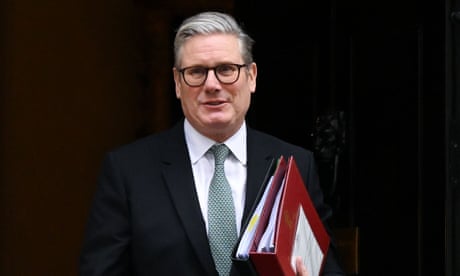Government publishes AI opportunities action plan amid backdrop of economic uncertainty in UK
This morning the Today programme broadcast an interview with Rupert Soames, president of the CBI, which shed some light on why some in the business world are losing confidence in Rachel Reeves. (See 10.51am.) Soames used to run Serco, the services company. (His brother Nicholas, the former MP, is a Tory peer.) Here are the key points.
Soames said that he thought the chances of the UK economy growing by 2% in 2025, which is what the Office for Budget Responsibility was forecasting in October, was “very slim”. He said:
The latest CBI forecast, we’re talking about [sub 1.5%, somewhere 1% and 1.5%]. I think what we think is going to happen, we think that the national insurance increases are going to feed through into inflation. So that’s not good news. We’re going to have a lower growth rate. Not good news. But also, because of things like the employment rights bill coming along, you’re going to find people laying people off and less likely to employ people to people.
He said that, while he would not say business confidence in the government had “gone”, he would say it was “bruised”. As an example of why, he cited the experience of a company in Derbyshire that has been making since 1784 and employs 280 people. He went on:
The combination of the living wage and the [national insurance increase] is completely wiping out their profits. No profits, and out profits they invest. So that is a real problem for them. And I think sometimes it’s not understood the extent of the increase, particularly on companies that employ lots of people.
He said the government should water down the proposals in the employment rights bill because currently they could lead to an “ugly rush” of firms getting rid of workers.
A general rule in life is that when you find yourself in the hole, then stop digging. And there’s some stuff coming down the road for businesses, particularly around the employment rights bill – which is definitely going to happen – but the landing place that the government decides to adopt is really important.
I’ve been in business 40 years, I’ve employed, been responsible for employing and hiring tens of thousands of people. I know a little bit about the psychology of people. And, as currently drafted, there are elements of the employment rights bill that are going to be powerful dissuaders from companies employing people.
I think there could be quite an ugly rush before some of these things come into force where people actually let people go.
The things like the probation periods in the employment rights bill – we don’t want that to become an adventure playground for human for employment rights lawyers.
UK gilt prices are rising further and faster than in other comparable economies and many in the City think Reeves’s decisions since July have made the situation worse, not better. “She has lost credibility with the financial markets,” said a former Downing Street aide who now advises leading businessmen. “They don’t think she knows what she’s doing. They don’t believe a word she says. They don’t believe she has any idea how to fix this” ….
In the City, they think [Keir] Starmer wants freedom of manoeuvre if Reeves is unable to salvage the situation. “The markets think Starmer will use her for the March statement and the spending review – all the tough stuff – then bin her,” the former No 10 adviser said. “I think they’re affording Starmer too much political nous, but that’s what he should do.”
Rachel Reeves is the chancellor for a good reason, because she’s the right person to do the job.
And one of the things I’d say about those kind of stories is when we won the general election, we won it as a team that was not afflicted by the kind of rivalries and personalities that had sometimes afflicted governments in the past. And we govern as a team and Rachel’s got the support of me, the prime minister and the whole cabinet.

